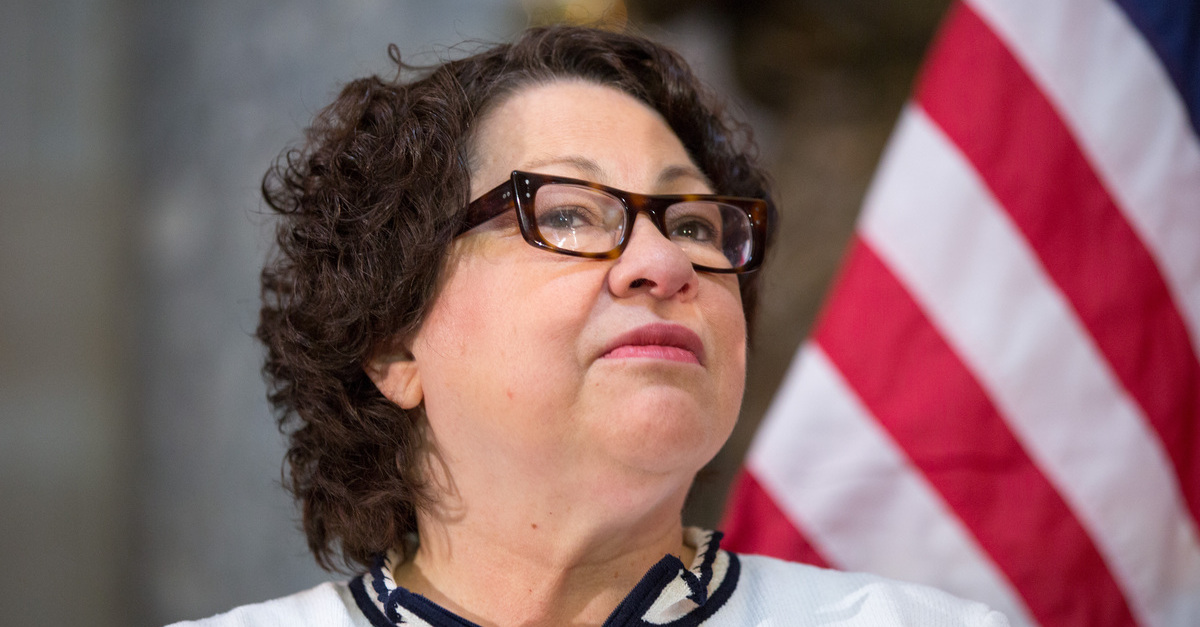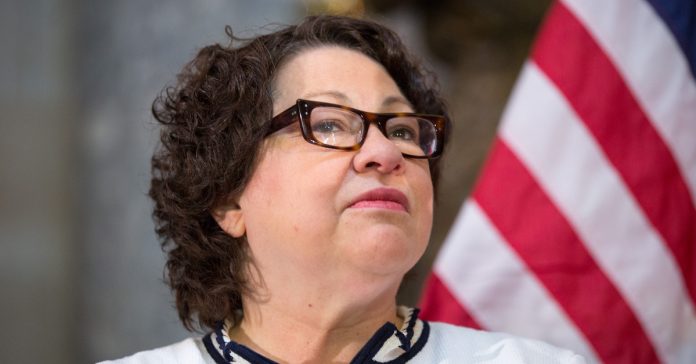
WASHINGTON, DC – MARCH 18: U.S. Supreme Court Justice Sonia Sotomayor participates in an annual Women’s History Month reception hosted by Pelosi in the U.S. capitol building on Capitol Hill in Washington, D.C. This year’s event honored the women Justices of the U.S. Supreme Court: Associate Justices Ruth Bader Ginsburg, Sonia Sotomayor, and Elena Kagan. (Photo by Allison Shelley/Getty Images)
U.S. Supreme Court Justice Sonia Sotomayor left a New York City gun licensing rule in place that allows the city to reject gun license applications on the grounds that an applicant lacks “good moral character.”
The case is the latest to come before the high court in the wake of its 2022 ruling in New York State Rifle & Pistol Ass’n v. Bruen, which expanded gun rights by striking down New York state’s handgun licensing regime as unconstitutional.
The application came before Sotomayor because she is the justice who hears emergency requests out of the New York-based U.S. Court of Appeals for the Second Circuit. Sotomayor denied the request without comment and without referring the matter to the full court for consideration.
In 2018, Joseph Srour applied to the New York City Police Department (NYPD) License Division for a permit to possess rifles and shotguns in his home, and the following year he applied for a license to possess handguns in his home. His applications were denied on the grounds that under New York’s rules, and specifically pointing to Srour’s prior arrests, bad driving history, and supposedly false statements on the applications as the reasons for denial.
Under New York Law, “no license shall be issued except for an applicant … (b) of good moral character … and (n) for whom no good cause exists for the denial of the license,” and things such as failure to disclose arrests on the application, lack of cooperation with background investigation are specifically authorized grounds for denial.
Srour failed to disclose either of his two arrests on his application, checking “No” in response to the question asking if he had ever been arrested.
His application was rejected and he received a notice that explained:
Based on your prior arrests for [ …] you have shown poor moral judgment and an unwillingness to abide by the law. The above circumstances, as well as your derogatory driving record (twenty-eight moving violations and thirty license suspensions), reflect negatively on your moral character and casts [sic] grave doubt upon your fitness to possess a firearm.
Another notice explained that Srour’s terrible driving record (on both land and water) and status as a “scofflaw” provided additional grounds for the denial:
Pursuant to 38 RCNY §§ 3-03(h) and 5-10(h), an applicant who has a “poor driving history, has multiple driver license suspensions, or has been declared a scofflaw by the New York State Department of Motor Vehicles,” may be denied a rifle/shotgun permit and/or handgun license. Mr. Srour’s driving history includes 28 moving violations from June 1991 to December 2013, 24 license suspensions between August 1991 and December 2000, and six license revocations between July 1992 and January 1995. In addition, he received two summons [sic] for Navigational Law violations in August 2012 and in August 2015, both of which were for the same offense (while on a Jet Ski), showing a disregard for the rules even after being informed of them. Notably, Mr. Srour’s Navigational Law violations occurred recently. Mr. Srour’s poor driving history demonstrates an inability to abide by laws and regulations, shows a lack of moral character, and provides an additional ground for denial.
Srour then sued New York City and NYPD Commissioner Edward A. Caban to challenge the denials and argued that the city’s regulations are unconstitutional under Bruen.
The district court issued a permanent injunction against the “good character” portion of the licensing scheme in October 2023. The U.S. Court of Appeals for the Second Circuit stayed that order pending appeal. Srour appealed that stay to the U.S. Supreme Court, arguing that the Second Circuit’s ruling was a “continu[ation of] its longstanding history of disregarding this Court’s Second Amendment jurisprudence.”
In his brief, Srour contended that it is constitutionally impermissible to require a gun license applicant to demonstrate “good moral character,” because there is no “historical analogue” for such a requirement as required under the Court’s ruling in Bruen, and because “forcing the citizenry to obtain the government’s permission before they may lawfully possess long guns is simply un-American.”
“The people are not required to ‘prove’ their worthiness before exercising the Right,” Srour argued about the Second Amendment.
A separate challenge to New York’s moral character requirement is already pending at the Supreme Court in another case, Antonyuk v. James.
Have a tip we should know? [email protected]

